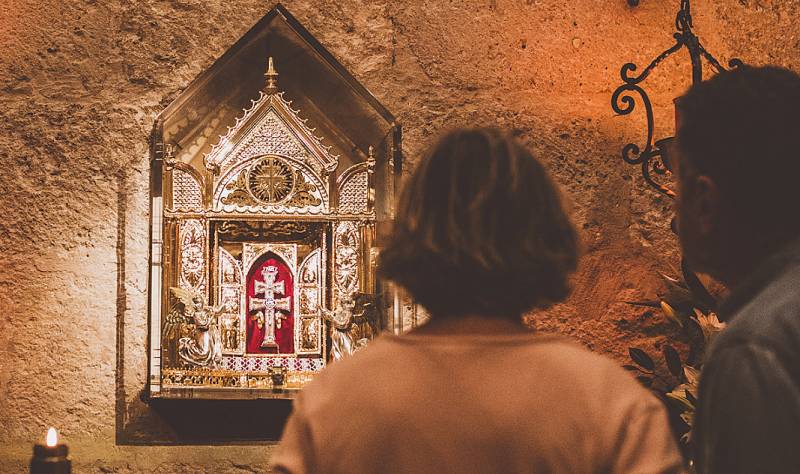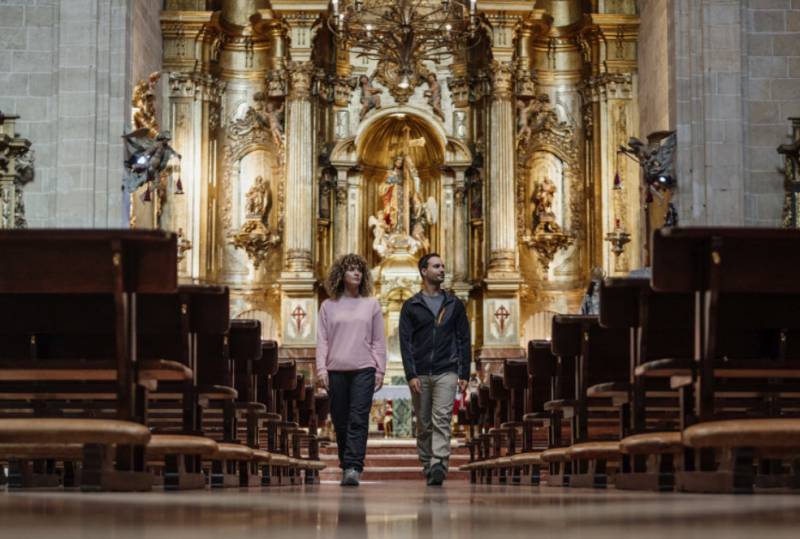Contact Caravaca Tourist Office +34 968 70 24 24
or send an Email
Click Here



















Contact Caravaca Tourist Office +34 968 70 24 24
or send an Email
Click Here
This site uses cookies. By continuing to browse the site, you are agreeing to our use of cookies. Read More (privacy and cookie policy)


 (Source: ITREM, tourist board of the Region of Murcia)
(Source: ITREM, tourist board of the Region of Murcia)
When Pope John Paul II granted a Holy Jubilee Year to Caravaca de la Cruz in 1998 the city became one of only five in the entire Catholic world to be elevated to this status, along with Rome, Jerusalem and the northern Spanish pilgrimage destinations of Santiago de Compostela and Santo Toribio de Liébana.
The first Jubilee held after this proclamation was in 2003, and with the event being held every seven years the event in 2024 is therefore the fourth. For visitors to Caravaca this means twelve months of intense activity all over the municipality – for example, in February alone, well before the peak season of the year, the programme includes the Carnival celebrations, a medieval fair, art exhibitions, the fiestas of Candelaria in Barranda, cinema screenings, theatre, children’s workshops… the events come thick and fast during Jubilee Year!
At the same time, during February pilgrimage groups are scheduled to arrive from all over Spain, including visitors from Murcia, Guadix, Bullas, Granada, Alcalá de Henares, Orihuela, Jumilla, Badajoz, Cabezo de Torres, Cartagena, Toledo, Fortuna, San Javier, Aragón, Madrid, Dolores de Pacheco, Vera, Puerto de Mazarrón, the Guardia Civil, Lorca, Sanlúcar de Barrameda, Puente Genil, the Alpujarras and Córdoba.
But the essence of the Jubilee Year in Caravaca de la Cruz is that for all visitors the celebrations illuminate their journey to the city along routes based on culture, tradition, history, gastronomy, nature and of course faith. Now that the 7-yearly event is firmly established in the calendar all over Europe, it is justifiable to claim that the 2024 Jubilee is set to be a truly extraordinary one both for Caravaca and for the Region of Murcia as a whole.
What is the Holy Jubilee Year?
The reason for Caravaca being granted its Jubilee Year lies in religious events which took place here almost 800 years ago. The “Santísima y Vera Cruz” (True and Holy Cross) has been a presence in this part of the world since the 13th century and since the Middle Ages the Christians and Catholic tradition has been that a fragment of the Cross on which Jesus died (known as a “Lignum Crucis”) has been safeguarded in Caravaca, first by the Knights Templar and then by the military-religious Order of Santiago.
 This has led to the development of a special veneration of the Cross, sanctioned by the Catholic church to the point where in the 18th century the Vatican gave it the status of a “latria” cult – in other words, on a par with the Holy Sacrament. This prestige transcended local and national geographical boundaries and Caravaca de la Cruz thus became a genuine hub of religious activity in the 16th, 17th and 18th centuries.
This has led to the development of a special veneration of the Cross, sanctioned by the Catholic church to the point where in the 18th century the Vatican gave it the status of a “latria” cult – in other words, on a par with the Holy Sacrament. This prestige transcended local and national geographical boundaries and Caravaca de la Cruz thus became a genuine hub of religious activity in the 16th, 17th and 18th centuries.
The special faith and devotion to the Holy Relic lay behind Caravaca becoming a destination for Pilgrims heading for the castle-sanctuary housing the cross from all over Europe, and as early as the 16th century they were served by a hospital in the city (the “Buen Suceso”). One-off Jubilees were decreed at various points during the 16th and 17th centuries in response to special festivities of the Cross and to a request sent by the Cofradía de la Vera Cruz (Brotherhood of the True Cross) to Pope Alexander VII in 1663 – this request refers to the pilgrims who were “frequently coming from all over Christendom to worship the Holy Relic”.
This practice of one-off Jubilee Years was revived in 1981, when John Paul II granted a special event to Caravaca to commemorate the 750th anniversary of the appearance of the Cross in the city. Another event followed in 1996, and it was in 1998 that the Vatican established that the Jubilee could be held every seven years “in perpetuum”, starting in 2003.
What is plenary indulgence?
In the theological terminology of the Catholic Church, an indulgence is a means of reducing the amount of punishment or atonement one has to undergo for sins committed, or, according to the Catechism, "a remission before God of the temporal punishment due to sins whose guilt has already been forgiven, which the faithful Christian who is duly disposed gains under certain prescribed conditions."
 Some of these reductions in penitence, or indulgences, are only partial, but a “plenary indulgence” is the “total remission” before God of earthly punishment, and it can be granted by the Catholic church in certain circumstances on any day of any year, whether or not it is a Holy Year.
Some of these reductions in penitence, or indulgences, are only partial, but a “plenary indulgence” is the “total remission” before God of earthly punishment, and it can be granted by the Catholic church in certain circumstances on any day of any year, whether or not it is a Holy Year.
However, conditions are established for the awarding of a plenary indulgence, and in the case of the Caravaca Jubilee Year it is specified that it can take place on the following dates:
- 3rd May and 14th September, feast days in the worship of the True Cross.
- On any one date during the year, chosen by each pilgrim.
- When a group united on their pilgrimage by their devotion arrives at their destination.
- During the official opening and closing ceremonies of the Holy Year.
- On days when religious ceremonies are held by the diocesan Bishop (in this case the Bishop of Cartagena).
The requirements for receiving a plenary indulgence are the following:
- Participating in any Mass in the Basilica during the year and praying for the intentions of the Pope.
- Should this participation not be possible it is sufficient to offer a prayer for peace in the world and the intentions of the Pope (the Credo, Our Father).
- Taking Confession and Holy Communion. These are not necessarily required on the day of visiting the Basilica and can take place within the previous or following few days in another Catholic church.
